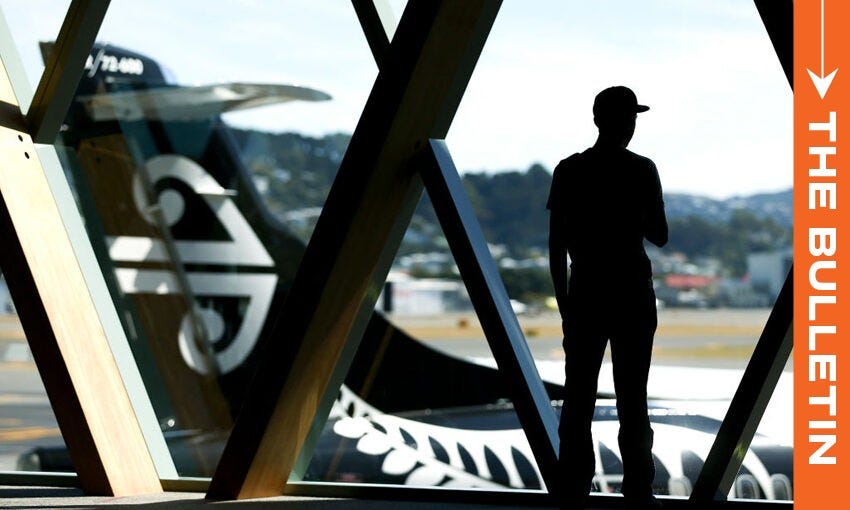Calls for airfare inquiry: Are we in a cost of flying crisis?
A war of words erupted yesterday between Consumer NZ and Air New Zealand.
Mōrena, and welcome to The Bulletin for Friday, July 19.
In today’s edition: SkyCity Casino to close its doors for five days, new research exposes gaps in headache treatment, and Winston Peters hasn’t heard from Chumbawumba. But first, the sky high cost of travelling around New Zealand. Should we be concerned?
Crisis point
“Remember when domestic flights were $29,” I asked in this piece for The Spinoff back in 2022. It was a plea for help, reflecting on a time when you could travel around the country without it costing an arm and a leg. Back then, Air New Zealand was in the news for rising ticket prices that were, partly, a hangover from Covid-19. Now, in July 2024, the national airline’s once again being called out for the cost of flying. Consumer NZ ignited the criticism yesterday when it released figures alleging an up to 300% increase in the cost of air travel over the past five years, as Stuff’s Brianna McIlraith reported. “Catching a flight has become a luxury for most,” her story began. Consumer’s claim was centred on a comparison between 11 Air New Zealand flights in 2023 and 2024 and equivalent fares from 2019 and 2021, finding that all bar one were now more expensive. It prompted a fiery response from the airline, but also questions about a more substantive investigation into this new crisis.
How has Air New Zealand responded?
On RNZ’s Morning Report yesterday morning, Air New Zealand’s head of domestic Scott Carr strongly pushed back on Consumer’s claims calling them “quite misleading”. I recommend listening to the interview if you’re interested, because the write-off doesn’t fully capture how staunchly Carr rejected any suggestion the airline was overcharging passengers. In short, his argument was that 11 flights was an insufficient sample size and that “average fares across [the] domestic network are only up 22%” over the five year period. Air New Zealand hasn’t shied away from admitting that travel is more expensive in 2024 than pre-pandemic, with the NBR (paywalled) reporting earlier in the year that capacity issues, fuel prices and airport costs were to blame. None of this, however, does anything to address the concerns of customers. In what could be coincidental timing, Air New Zealand launched a domestic sale on Wednesday night which received a fair amount of media coverage, including a plug on Seven Sharp. Free marketing, yes, but also likely a symptom of just how pricey it now is to travel around the country.
Does the airline industry need an inquiry?
As noted by BusinessDesk’s Pattrick Smellie in February, Air New Zealand holds an 86% market share of the domestic travel market, which is about as close to a monopoly as you can get – a point raised by Corin Dann in the RNZ interview yesterday morning. Comparisons can reasonably be made to sectors like banking and supermarkets, both under intense scrutiny over a lack of competition. While Air New Zealand claims transparency around its airfares, there’s nothing more transparent than throwing the doors open to an external investigation. This Newsroom report on the Commerce Commission’s draft report into the banking sector is a useful comparison, as it notes that while the banking sector claims there is an innocent explanation for high profits, the consumer watchdog suggested it may just boil down to a lack of competition. Just this week, reported the Herald, the Commerce Commission expressed concern over a proposed merger of Foodstuff’s North Island and South Island.
Consumer NZ is leading a renewed call for deeper scrutiny of airfares, arguing that recent market studies have revealed how limited competition could result in poor outcomes. It’s not the first time a call like this has been made, and Air New Zealand said in May it would be “happy to open the books”, the Herald’s Grant Bradley reported.
Auckland Airport also in the limelight
Tangentially related, but it’s also been a big week for Auckland Airport. Air New Zealand has previously claimed airport costs have been one reason for a rise in airfares, and warned in February that the projected costs for the airport’s redevelopment would be “paid for by airlines through steadily increasing aeronautical charges, leading to unaffordable airfares for some Kiwis". This week, as 1News reported, the Commerce Commission said that while some price increases were “necessary” to fund the investment, “the airport’s charges over the five-year period [from July 2022 to 2027] are in excess of what is reasonable”. Speaking to Newstalk ZB’s Mike Hosking, Air New Zealand boss Greg Foran said more regulatory change to constrain overspending was required and it was something the airline would be lobbying for. “Auckland Airport are doing what Auckland Airport would do, it’s the regulations that need to change and it’s [commerce minister] Andrew Bailey that can make that happen.”
Like what you read? Become a member!
Every contribution exclusively funds our journalism and helps keep it freely available to all. Join up today!
Already a member? Ka nui te mihi, your support means the world to us.
SkyCity closes casino for five days after DIA investigation
SkyCity will close its Auckland casino for five days after breaching the Gambling Act, something Internal Affairs described as “extremely significant”. It follows an investigation that found a gambler spent more than nine hours continuously playing the pokies. As RNZ’s Checkpoint reported, there were 23 occasions when the gambler played uninterrupted for several hours. SkyCity’s decision to shut its doors, at a cost of $1m per a day, was unprecedented. But the company acknowledged it had breached the act and formally apologised. Last year, Newshub’s Michael Morrah spoke to a woman who alleged she spent up to 18 hours gambling at SkyCity without any intervention from staff.
Listen: We may have slain the inflation dragon
Softer-than-expected inflation figures this week suggest the inflation dragon – the one that has savaged real wages and borrowing costs for the last three years – may have finally been shoved back in its cave. Kiwibank's Mary Jo Vergara joins When the Facts Change to discuss what that means going forward for interest rates in our housing-market-with-bits-tacked-on economy.
Markets are now saying that the Reserve Bank could now cut the Official Cash Rate by the end of this year, but how many cuts can we hope for? Listen in to find out.
The struggle to find migraine treatment
New research published this morning in the NZ Medical Journal (paywalled) reveals that, despite being a common condition, migraine disease is often incorrectly or under treated in Aotearoa. The research used a survey run by the Migraine Foundation and found that around a quarter of people are using opioids while nearly one in five were taking opioids more frequently than recommended. As I wrote last year for The Spinoff, newer and potentially more effective migraine treatments are on offer in New Zealand, but are unfunded and often prohibitively expensive for sufferers.
The Migraine Foundation, in a statement, says it’s still waiting to learn what the government’s recent Pharmac funding boost could mean for migraine treatments.
Some recommended listening: What latest neuroimaging tell us about migraines and the brain (RNZ Nine to Noon)
Click and Collect
It’s been a busy time for the Commerce Commission. BusinessDesk (paywalled) looks at the latest decision involving music firm Serato.
Winston Peters hasn’t heard from Chumbawumba or ex-Australian foreign minister Bob Carr over promised legal action from the start of the year. The Spinoff’s Gabi Lardies broke the story that a cease and desist letter was threatened over Peters’ use of the song Tubthumping.
I couldn’t work out how to weave it into this morning’s lead, but I enjoyed this 2023 Financial Review profile of Air New Zealand’s Greg Foran that looked at his time spent as a senior boss at Walmart in the United States.
Today’s Media Insider delves into the world of “advertising genius Tony Williams”, including the (in)famous “bugger” ad. After reading Shayne Currie’s column, I suggest you go and read Alex Casey’s incredibly detailed oral history of the bugger ad which is one of the best things I’ve read in 2024.
Tauranga goes to the poll this Saturday for the first time in nearly five years.
Is it too early to label The Traitors NZ season two our best local reality season ever? Maybe, but I still suggest you read Hera Lindsay Bird’s argument for banning all celebrities from TV game shows, and Tara Ward’s latest power ranking from earlier in the week.
Anna Rawhiti-Connell argues that the more you know about AI the more helpfully boring it becomes. Emily Draper bids farewell to her antidepressants. Vera Ellen talks to Pōneke's underground musicians about the promise of new venues and the future of the scene in the capital. Shanti Mathias explains what's in the draft version of the second emissions reduction plan. Hera Lindsay Bird advises a reader who wants to publish a creative essay about her ex.
Trump supporters don ear bandages
It’s undoubtedly been one of the most remarkable weeks in US politics in my lifetime, with the attempted assassination of Donald Trump. I’ve spent the last few days tuning in and out of the Republican National Convention as the former president was formally nominated ahead of November’s election. But one story caught my eye yesterday – reports that Republicans, in solidarity with Trump, have been donning ear bandages. To cap the week, the BBC has some footage of this emerging phenomenon – and here’s a post as well from our friends at Shit You Should Care About.
That’s it for another week, thanks for reading. I’ll see you back here on Monday. Have a great weekend!
Let me know in the comments, or get in touch with me at thebulletin@thespinoff.co.nz, if you have any feedback on today’s issue or anything in the news.
If you liked what you read today, share The Bulletin with friends, family and colleagues.


















Air New Zealand , an airline i patronised for 40 years, is incapable of self examination.
After a seriously negative experience last year i found them incapable of openness to customer complaint while the CAA investigation found my version of events correct and yet Air NZ still refused to acknowledge this and banned me for two years. The best outcome for me is getting to experience other airlines which are better. As a diagnosed sufferer of PTSD just the sight of the back and white bird exudes a shadow
Recent Inflation was NOT just too much money chasing too few goods, but also failure to tax Covid relief money back OUT of the economy as it travelled up the business chain to the investor class. This was a global phenomenon that resulted in a great deal of money flowing into asset speculation, and thus record highs in stock-market prices. Stockholders expectations of returns based on these new high stock values resulted in so-called 'greedflation'. Governments' endorsement of shares-based private super (Kiwisaver etc.) and sovereign wealth funds (such as the NZ state superannuation fund) made price control politically unpalatable.
The end of high inflation is not the end of this anomaly of distribution, it just means that this flow of excess profits from wage-earner to stockholder is not getting worse. The imbalance remains in place until the wages share of business revenue is restored to its former level.
In a future emergency, a windfall tax /super-tax on both the highest income bracket and corporation tax should be introduced at the same time as emergency relief, and maintained until all relief money is recovered to the government. To fail in this is no better than endorsement of 'war-profiteering'.